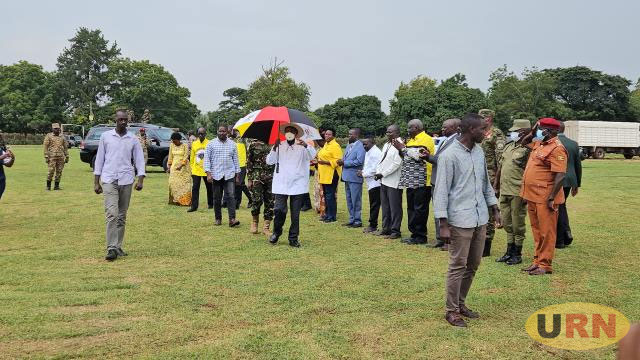
Lira, Uganda | THE INDEPENDENT | President Yoweri Kaguta Museveni has advised leaders in the Lango Sub-region to form a select committee of trusted individuals to engage the government in the ongoing cattle compensation program. The proposal came on Sunday during a meeting with leaders of the sub-region over the long-standing issue of livestock compensation, a matter that has sparked emotions due to persistent delays.
Having listened to complaints regarding the current compensation exercise, the President urged leaders to come up with an alternative strategy they believe would work better than the existing one, which has been criticized as slow and ineffective.
“Select a group whom you trust, you people. I think the lawyers you sit behind a bit. You have done your work so don’t insist on coming this other way,” the President said. He questioned whether the current procedure is the best way to resolve the issue, adding: “If it is the best way, then we will continue. If there is a better way, then we will look at it also. This is why I said, let’s go and talk about it.”
On resources, Museveni cautioned the population against expecting instant solutions. “There are very many issues. It is not correct to give the impression that all this can be done at a go. I still insist on our old method of mot mot (a step at a time). You go far, but if you say this one here, this one here, you are going to fail.” The compensation program traces back to lawsuits filed in 2003 by livestock claimants from Acholi, Lango and Teso sub-regions in the High Courts of Gulu, Lira, Soroti and Arua.
In March 2022, government officially launched the program with a budget of UGX 200 billion. Museveni explained that the initiative was not a standard practice but an exceptional measure to foster peace and reconciliation.
However, the Minister for Justice and Constitutional Affairs, Nobert Mao, argued that such compensation is legally provided for.
This prompted the President to warn Ugandans against trusting Mao. “Be careful about Mao because what happened was, for us, we were planning for rehabilitation but some lawyers went to court and got this award of compensation. When I heard about it, I said, you people talk and see how to resolve it. But now Mao is saying that because they smuggled it into law, it is also law.
The problem is that war is so destructive that compensation is impossible.” Earlier, leaders and beneficiaries had complained that implementation of the program by the ministry is marred by corruption, fraud and extortion at various levels. Vox pop on corruption:
One complainant from Amolatar District expressed fear that forming a new compensation model may deny claimants their dues.
Meanwhile, Angelous Okello, one of the initial claimants who in 2022 received a dummy cheque from the President in Soroti, is now advocating for scrapping the entire program to pave way for a new approach.
After you have cancelled, you sit down with the technical people and design another means of rehabilitating the entire community of Lango sub-region because they also lost properties. This corruption is now unmanageable,” he added. However, Deputy Attorney General Jackson Kafuuzi Karugaba dismissed claims that people are not being paid, saying those who receive payments usually keep silent.
Kafuuzi handed over a box containing the list of claimants so far paid in the Lango sub-region, along with the amounts. He promised that the records would be shared with district administrative officers to be pinned on district noticeboards. The box was received by Hon. Judith Alyek, the Chairperson of the Lango Parliamentary Group. He admitted, however, that some claimants have not received payments due to technical reasons.
The cattle compensation program was introduced following raids between the 1970s and 1980s during the wars. Between 2009 and 2014, Museveni directed that claims be settled to restore local economies in Acholi, Lango and Teso, which relied heavily on livestock. An inter-ministerial committee later verified claimants — 16,946 in Acholi, 42,024 in Lango, and 33,664 in Teso.
In 2021, the verification was devolved to district structures, involving Chief Administrative Officers, DSOs, DVOs, LC leaders and community elders. The Ministry of Justice and Constitutional Affairs subsequently printed and issued data cards for claimants to fill in their bio-data, which is now used for payments.
****
URN
 The Independent Uganda: You get the Truth we Pay the Price
The Independent Uganda: You get the Truth we Pay the Price



